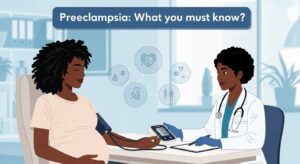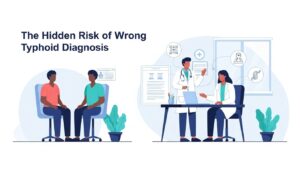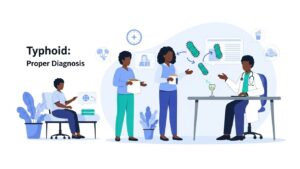An ectopic pregnancy occurs when a fertilized egg implants and grows outside the main cavity of the uterus, most commonly in the fallopian tube. This condition is often referred to as a tubal pregnancy. In rarer cases, the fertilized egg may implant in other areas such as the ovary, abdominal cavity, or cervix. Ectopic pregnancies are serious and can be life-threatening if left untreated, necessitating immediate medical attention.
Causes of Ectopic Pregnancy
Normally, a fertilized egg travels through the fallopian tube to reach the uterus, where it attaches to the uterine lining. However, if the fallopian tube is blocked or damaged, the egg can become stuck and implant outside the uterus.
Key Causes:
- Infections: Conditions like pelvic inflammatory disease (PID) can cause scarring in the tubes.
- Scar Tissue: Previous surgeries or conditions like endometriosis can create adhesions that hinder proper egg movement.
- Fertility Treatments: Assisted reproductive technologies, such as in vitro fertilization (IVF), increase the risk of ectopic pregnancies.
- Structural Abnormalities: Any irregularities in reproductive organs may lead to improper implantation.
Risk Factors
Several factors can increase the likelihood of experiencing an ectopic pregnancy:
Common Risk Factors:
- Previous Ectopic Pregnancies: A history significantly heightens recurrence risk.
- Fallopian Tube Surgery: Previous surgeries on the tubes can increase susceptibility.
- Age: Women over 35 are more susceptible to ectopic pregnancies.
- Lifestyle Factors: Smoking has been linked to impaired fallopian tube function.
- Intrauterine Devices (IUDs): Though rare, IUDs can slightly elevate risk.
It’s important to note that ectopic pregnancies can occur even in women with no known risk factors.
Symptoms of Ectopic Pregnancy
Ectopic pregnancy may initially present with common early signs of pregnancy, such as a missed period and nausea. However, distinct symptoms require immediate medical attention.
Early Symptoms:
- Sharp Pain: Pain may occur in the abdomen, pelvis, shoulder, or neck.
- Dizziness or Fainting: These symptoms may indicate internal bleeding.
- Heavy Bleeding: Severe pain or heavy bleeding should prompt immediate medical care.
Treatment Options
Treatment for ectopic pregnancy depends on various factors including progression and severity of symptoms.
Methotrexate Therapy
- A medication that halts cell growth, suitable for early-stage ectopic pregnancies.
- Administered as a single-dose injection to avoid surgery.
- Requires follow-up blood tests to monitor effectiveness.
Surgical Intervention
- Necessary if the pregnancy is advanced or causing severe symptoms.
- Laparoscopy (minimally invasive surgery) removes ectopic tissue.
- Emergency surgery may be needed in cases of rupture.
Coping with an Ectopic Pregnancy
Experiencing an ectopic pregnancy can be emotionally challenging. Recovery involves addressing both physical and mental health needs.
Support Resources:
- Counselling Services: Professional help can assist in processing emotions and planning for future pregnancies.
- Support Groups: Connecting with others who have had similar experiences provides empathy and understanding.
- Practical Support from Loved Ones: Assistance with daily tasks during recovery is invaluable.
Coping with grief after an ectopic pregnancy is complex and varies from person to person. Feelings of sadness, anger, or loneliness are common. Comprehensive support systems combining medical care and emotional support enhance overall well-being.
Ectopic pregnancies require prompt treatment to avoid serious health risks. Understanding the symptoms, risk factors, and treatment options empowers individuals to take timely action. If you experience unusual symptoms during early pregnancy, consult a healthcare professional immediately.
Contact Well-Life Hospital
At Well-Life Hospital, a renowned infertility treatment center located at No. 12 Atbara Street, Wuse 2, Abuja, FCT, we are dedicated to providing compassionate and comprehensive care to help you on your journey to parenthood. To learn more about our IVF services and to book a consultation, visit our website or contact us today.
- Website: welllifehospital.com
- Instagram: @welllifehospital
- Facebook: Well Life Hospital
- Twitter: @Well_Life_H
- TikTok: @welllifehospital
- YouTube: Well Life Hospital
- Mobile : +234 906 000 4314
… Your wellbeing is our goa






